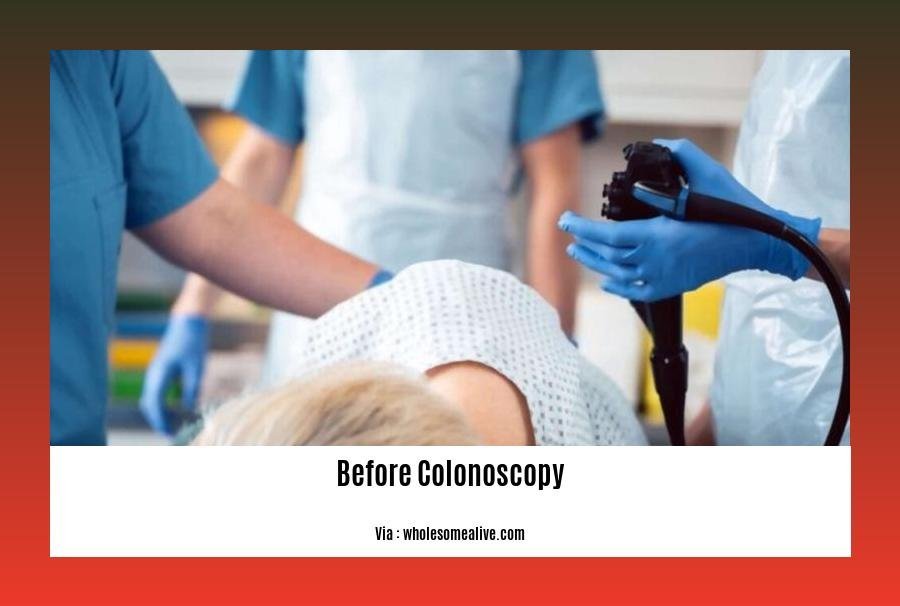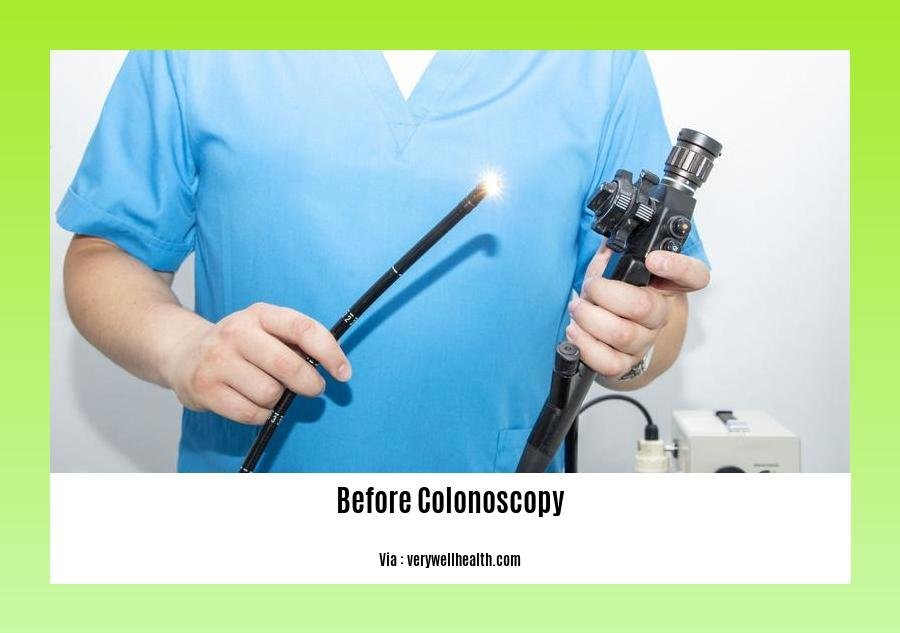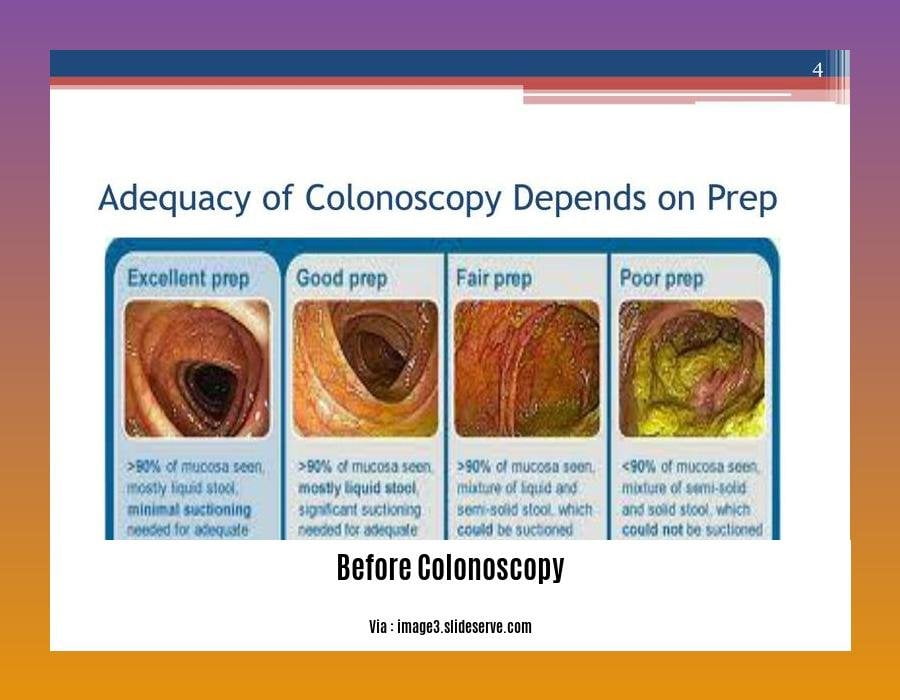Let’s talk about colonoscopies. While they might not be the most glamorous medical procedure, they play a crucial role in maintaining your health, especially as you age. Understanding the importance of proper colon cleansing and knowing what to expect can go a long way in making the whole experience smoother and less daunting. This comprehensive guide is here to walk you through every step of the process.

Cleaning Out Your Colon Before a Colonoscopy
Getting your colonoscopy might not be how you envision spending a day, but it’s a vital part of staying healthy. One thing that can significantly improve the experience and the outcome is ensuring a clean colon beforehand. This allows your doctor to have a clear view during the procedure and gather the most accurate information about your health.
Why is a Clean Colon So Important?
Imagine trying to look through a dirty window – you wouldn’t see much, right? The same principle applies to a colonoscopy. Residual waste in your colon can obscure your doctor’s view, making it difficult to identify potential problems. A clean colon, on the other hand, allows for a thorough examination and increases the chances of detecting any abnormalities, including polyps, inflammation, or other irregularities.
How Do You Actually Clean Out Your Colon?
The most common approach to preparing for a colonoscopy involves using a laxative. Think of laxatives as little helpers that encourage your colon to empty everything out, allowing for a clearer view during the procedure.
There are two primary types of laxatives:
- Stimulant Laxatives: These stimulate the muscles in your colon, causing them to contract and move things along more quickly.
- Osmotic Laxatives: Rather than stimulating the muscles directly, osmotic laxatives draw water into your colon. This softens the stool and makes it easier to pass.
Which Laxative is Right for You?
The choice of laxative depends on a few factors, including your age, overall health, and medical history. Your doctor will be able to recommend the most appropriate type for you.
Using a Laxative: What to Expect
While the specific usage instructions for your laxative will vary depending on what your doctor prescribes, there are a few general guidelines that usually apply:
- Start the Day Before: In most cases, you’ll begin taking the laxative the day before your scheduled colonoscopy.
- Stay Hydrated: Drinking plenty of fluids throughout the preparation process is essential to prevent dehydration and help things move along smoothly.
- Lighten Up Your Diet: Stick to a light diet the day before your colonoscopy. Your doctor will provide specific dietary recommendations, but generally, you’ll need to avoid solid foods and consume only clear liquids.
What Happens During the Colonoscopy Itself?
During the colonoscopy, your doctor will use a colonoscope, a thin, flexible tube with a tiny camera at the end, to examine the lining of your colon. You’ll be given medication to help you relax and remain comfortable throughout the procedure, which typically lasts between 30 minutes to an hour.
After the Colonoscopy
Some mild cramping or bloating after the procedure is normal and should subside within a few days. Your doctor may recommend a special diet for a few days following the colonoscopy, so be sure to follow their instructions.
Are There Any Risks?
While colonoscopies are generally very safe, like any medical procedure, there are potential risks, albeit rare. These include:
- Bleeding
- Infection
- Perforation of the colon (a very small hole)
Discussing these risks with your doctor is important for making informed decisions about your health.
Talk to Your Doctor!
Your doctor is your best source of information about colonoscopies. They can address your questions, discuss the benefits and risks, and determine if a colonoscopy is appropriate for you.
If you’re curious about Chinese food facts, check out our article on Chinese food facts to discover interesting insights and trivia about this delicious cuisine.
Looking to detox and eat clean? Explore our guide on clean eating detox to learn about the benefits and different methods of detoxing through healthy food choices.
If you’re following the Daniel Fast, it’s important to know which foods to avoid. Find out more about the Daniel fast foods to avoid in order to stay on track with your dietary restrictions.

How Long Does It Take to Clean Out Your Colon for a Colonoscopy?
Getting ready for your colonoscopy naturally leads to questions about the preparation process, particularly how long it takes to cleanse your system.
Getting Your Colonoscopy-Ready
The journey towards a clean colon for your colonoscopy typically begins about a day before your scheduled procedure. At this point, you’ll transition to a clear liquid diet, which might include broth, clear juices like apple or white grape, plain gelatin, black coffee, or tea. This “mini-cleanse” is all about providing a clear view for your doctor during the examination.
Along with the clear liquids, your doctor will likely prescribe laxatives. These are designed to speed up the digestive process and encourage bowel movements. The specific laxative schedule will vary depending on your individual needs and your doctor’s recommendations.
The Day of the Procedure
On the day of your colonoscopy, you can usually continue your clear liquid diet up to about two hours before the scheduled time. After that, it’s time to pause even the liquids, including water.
During and After the Colonoscopy
Rest assured, you won’t be aware of the cleaning process during the procedure itself. You’ll be comfortably relaxed as your doctor uses a thin, flexible scope with a camera to visualize the lining of your colon.
Afterward, you might experience some mild discomfort, similar to the feeling of being constipated or after a large meal. This is normal and should improve as you gradually return to your regular diet, following your doctor’s instructions.
Making the Prep Easier
Here are some tips from seasoned colonoscopy veterans to help make the preparation process a bit smoother:
- Hydration is Key: Staying hydrated is crucial, especially when taking laxatives. Remember those clear liquids? They’re not just for cleaning – they keep you hydrated.
- Steer Clear of Solids: It’s best to resist the temptation to sneak in snacks. Solid foods, particularly those high in fiber, can interfere with the effectiveness of the preparation.
- Dairy? Probably Not: Avoid dairy products during your preparation as they can be harder to digest and may linger in your system.
- When in Doubt, Ask: Your doctor’s office has heard it all! Don’t hesitate to reach out with any questions or concerns you might have; they are there to help you through every step of the way.
A Few Things to Keep in Mind
Remember that every person and every colonoscopy preparation is unique. Factors such as your overall health, medical history, and the specific type of colonoscopy you’re having can influence the process.
Ongoing research continually provides us with a better understanding of the digestive system and the best practices for procedures like colonoscopies. Your doctor is your most reliable source of personalized guidance as they stay informed about the latest medical advancements and can tailor their advice to your specific needs.
How Do You Completely Empty Your Bowels for a Colonoscopy?
Preparing for a colonoscopy requires a clean slate – literally! Emptying your bowels entirely before the procedure is essential for a successful examination.
Why is a clean colon so important?
A clean colon provides optimal visibility during the procedure. It allows your doctor to identify any abnormalities, whether they are small polyps, areas of inflammation, or any other irregularities that require attention.
Let’s break down how to nail your bowel prep:
- Timing is Everything: Start Early: Begin your preparation the day before your colonoscopy. Starting early gives your body ample time to process the prep solution and ensures a more thorough cleansing.
- Your Prep, Your Guide: Each bowel prep is unique, with some involving special drinks and others requiring pills. Your doctor will select the most suitable option for you. Carefully read and follow the instructions provided with your prescribed prep.
- Hydration is Key: Drink Up!: Aim for eight glasses of water or clear liquids throughout the day. Proper hydration is crucial for flushing out your system and preventing dehydration, especially when taking laxatives.
- See-Through Grub: Embrace the Clear Liquid Diet: The day before your colonoscopy, bid farewell to solid foods and embrace a clear liquid diet. This includes broth, clear juices (no pulp!), Jell-O, and, of course, water.
- Over-the-Counter Helpers: Laxatives: If your prescribed prep doesn’t include laxatives, talk to your doctor about incorporating over-the-counter options. These can provide an extra push to ensure a thorough cleanse.
Additional Tips to Make Prep a Breeze:
- Clear Liquids Decoded: Beyond water, your clear liquid options include broth (chicken, beef, or vegetable), clear gelatin desserts, clear tea (herbal teas are great!), and clear sports drinks.
- Caffeine and Alcohol: A Big No-No: Avoid caffeine and alcohol during your prep as they can interfere with hydration and potentially irritate your digestive system.
- Embrace the Splatter Throne: Bowel prep can lead to frequent and sometimes urgent bathroom trips.
- Don’t Suffer in Silence: If you have any questions, concerns, or are experiencing prolonged discomfort, reach out to your doctor’s office. They are there to support you throughout the entire process.
A successful colonoscopy begins with successful bowel prep. By following these tips and maintaining open communication with your healthcare team, you can ensure a smoother experience and a more accurate examination.
How Do You Know if Your Colon is Clean Enough for a Colonoscopy?
Achieving a clean colon is crucial for a successful colonoscopy. But how can you be sure yours is truly ready for the procedure?
What does a clean colon actually look like?
The goal is for your stool to resemble clear, yellow liquid, similar in color and consistency to apple juice. If you notice any solid bits or cloudiness, it probably means you need to continue prepping.
How do you know when you’re done emptying out?
You might experience the urge to have a bowel movement even after your stool becomes clear and liquid. This can be misleading as it doesn’t necessarily mean there’s more to expel. Similar to a water balloon that’s been emptied, continuing to “go” after this point can lead to dehydration.
Why is all of this so important?
Visualize trying to spot a small scratch on a dirty car – it’s much harder to see compared to a clean car. A clean colon offers a similar advantage during a colonoscopy, allowing your doctor to detect even subtle abnormalities that might be missed otherwise.
If your colon isn’t adequately prepped, it can obscure your doctor’s view and potentially lead to missed diagnoses or the need for repeat colonoscopies.
Listen to Your Body and Your Doctor
While these signs can serve as a guide, every individual is different. Follow your doctor’s instructions closely and don’t hesitate to reach out to their office if you have any questions or uncertainties.
Is the Cleanse Before a Colonoscopy Good for You?
The pre-colonoscopy cleanse, while not the most enjoyable part of the process, is essential for a successful procedure. But is it inherently “good” for you beyond its role in colonoscopy preparation?
Why is a clean colon so important for the procedure?
Imagine trying to find a tiny scratch on a muddy car—it’s challenging! Similarly, any remaining residue from digested food can obscure your doctor’s view during the colonoscopy, potentially masking small polyps or other significant changes.
A clean colon, however, acts like a clean slate, allowing for a thorough and accurate examination.
But is all this cleansing actually good for you, beyond the colonoscopy itself?
There’s some debate on whether a colon cleanse offers benefits beyond colonoscopy preparation. Some experts suggest that it might provide a “reset” for your digestive system, and some people report feeling lighter and more energetic afterward.
However, much of this is anecdotal, and scientific evidence supporting claims of a system “detox” is limited. Our bodies are naturally equipped to eliminate waste, and the potent laxatives used for the cleanse can temporarily disrupt the balance of gut bacteria. Research on the long-term effects of colonoscopy prep on gut health is ongoing.
While the cleanse itself might not offer magical health benefits, it’s crucial for a successful colonoscopy, which is paramount for early detection and intervention if any problems arise.
How Can You Tell if Your Colon is Empty?
Knowing when you’ve achieved a clean colon is an important part of the colonoscopy preparation process.
Here are a few signs that suggest your colon is likely empty:
- Your poop is basically water: This is the most obvious clue. When your colon is empty, any remaining output should be clear liquid, similar to apple juice in color and consistency.
- You’re all pooped out (literally): You might still feel the urge to go, but nothing else comes out. This often indicates successful cleansing.
- Your tummy feels pretty flat: As your colon empties, you’ll likely notice your abdomen feeling less full and appearing flatter.
- No more gurgling or gas: Rumbling, gurgling, and gas are often signs of activity in your digestive system. You’ll probably experience less of these sensations when your colon is empty.
A Word of Caution
Keep in mind that bodies respond uniquely to preparation. If you’re uncertain about the status of your colon cleanse, err on the side of caution and continue your bowel prep a little longer or reach out to your doctor’s office for guidance.
Should I Still Be Pooping the Morning of My Colonoscopy?
Ideally, bowel movements should be minimal and primarily clear liquid by the morning of your colonoscopy. This signifies a well-prepped colon, ready for a clear examination.
Solid bowel movements on the morning of your procedure might indicate that your prep wasn’t fully effective. However, it’s not uncommon and doesn’t automatically mean your appointment needs to be rescheduled.
In this situation, contact your doctor’s office immediately. They can assess the situation and advise you on the best course of action. They might recommend continuing the prep for a bit longer or, in some cases, rescheduling the colonoscopy.
Remember, the primary goal of the preparation process is to ensure accurate results and a thorough examination. Open communication with your healthcare team is essential for achieving this.
How Long Does It Take to Poop Again After a Colonoscopy?
It’s natural to wonder when your bowel movements will return to their regular schedule after a colonoscopy. Most people find themselves back in their usual rhythm within a few days.
During the procedure, your colon undergoes a thorough cleansing, and it needs time to recover and regain its natural rhythm.
Temporary Changes in Bowel Movements:
- Constipation: Some people experience constipation after a colonoscopy as their colon takes its time getting back on track. Drinking plenty of fluids and consuming fiber-rich foods can help.
- Diarrhea: Others might experience diarrhea as their colon continues to flush out remnants of the preparation solution. This is typically short-lived.
- Changes in Stool Consistency: Your stool might be more watery or loose in the days following the procedure, but this should normalize within a few days.
If you have any concerns about your bowel movements or experience discomfort after your colonoscopy, consult with your doctor.
How Many Times Will I Poop During Colonoscopy Prep?
Preparing for a colonoscopy often involves frequent trips to the bathroom. While it varies from person to person, most people find themselves making a beeline for the bathroom every 30 minutes to an hour once the prep solution kicks in.
Factors Affecting Bathroom Frequency:
- Type of Prep Solution: Different solutions work with varying levels of, shall we say, efficiency.
- Individual Response: People’s bodies respond uniquely to the prep solution.
- Quantity Consumed: The more you drink, the more you’ll likely need to go.
- Responding to the Urge: Don’t delay when nature calls. Answering the urge promptly can lead to a more manageable bathroom schedule.
Tips to Manage:
- Stay hydrated with plenty of clear liquids throughout the day.
- Avoid solid foods during the prep period.
If you have anxieties or questions about the preparation process, don’t hesitate to reach out to your doctor. They are there to guide you through it.
How Do You Know When Your System is Cleaned Out for a Colonoscopy?
Knowing when your digestive system is adequately cleansed for a colonoscopy is essential. The goal is not to achieve complete emptiness, which isn’t possible, but rather to ensure a thorough cleansing that allows for a clear view during the procedure.
So, how do you know when you’ve reached that “squeaky clean” stage?
The appearance of your stool offers the most reliable indicator. Aim for a consistently clear, yellow liquid, similar to urine in color.
Steps to a Clean Colon:
- Follow the Directions: Adhering to your doctor’s instructions regarding the bowel prep solution is crucial. This includes proper mixing, timing, and dosage.
- Flush It Out: Drink plenty of clear fluids like water, clear broth, and sports drinks throughout the preparation process. These help to cleanse your system effectively.
- Monitor Your “Output”: Pay attention to the appearance of your stool. The goal is to achieve a clear, yellow liquid consistently.
- Finish Strong: Don’t stop your prep solution prematurely, even if you start seeing clear liquid early on. Completing the entire amount ensures a thorough cleanse.
A Few Extra Tips to Make Things Easier:
- Straw Power: Using a straw to drink the prep solution can make it more manageable.
- Nausea Buster: If you experience nausea, try sour candy or ginger ale for relief.
- Don’t Be Shy, Ask Questions: Reach out to your doctor if you have any concerns or questions during the preparation process.
Remember, a clean colon is essential for a successful colonoscopy.
Do I Have to Drink All 4 Liters of Colonoscopy Prep?
Seeing 4 liters of colonoscopy prep solution can be daunting, but it’s important to understand its purpose. This prep is crucial for achieving a clear view during your colonoscopy.
While it might seem like a lot, you likely won’t be consuming all 4 liters at once. Your doctor will probably recommend splitting it into two doses of 2 liters each, one in the evening before your procedure and the other on the morning of. This spaced-out approach makes it easier to manage.
Tips to Manage the Prep:
- Sip Slowly: Instead of guzzling it down, try sipping on a glass every 15 minutes.
- Use a Straw: Straws can make it easier to consume large quantities of liquid.
- Monitor Your Output: Pay attention to the color of your bowel movements. Ideally, you want it to resemble clear liquid.
Why is finishing the prep so important?
An incomplete prep can result in an unclear view during the colonoscopy, potentially leading to missed diagnoses.
What if I really can’t stomach the whole thing?
Don’t hesitate to contact your doctor’s office if you’re struggling to consume the entire prep solution. They might recommend an alternative or offer tips to make it more bearable.
Key Points:
- Importance of a Clean Colon: A clean colon is essential for an effective colonoscopy, as it allows for clear visualization of the colon’s lining.
- Bowel Preparation: This typically involves a clear liquid diet 24 hours prior to the procedure and the use of laxatives to clear the bowels.
- Following Instructions: It’s crucial to follow bowel preparation instructions carefully to ensure a thorough colon cleanse, as any leftover residue can compromise the accuracy of the colonoscopy.
- Open Communication: Don’t hesitate to communicate any questions or concerns to your doctor.
Remember, a successful colonoscopy starts with a successful bowel prep. By following these steps and working closely with your healthcare provider, you can ensure a smooth and informative procedure.
- Unveiling the Enigma: Mansoureh Khojasteh Bagherzadeh’s Public Appearances & Private Life in Iran - July 18, 2025
- Unveiling the Mystery: Mansoureh Khojasteh Bagherzadeh’s Husband: A Rare Glimpse into a Private Life - July 18, 2025
- Unveiling Masoud Khamenei’s Mother: Power, Influence, and Iran’s Future - July 18, 2025
















